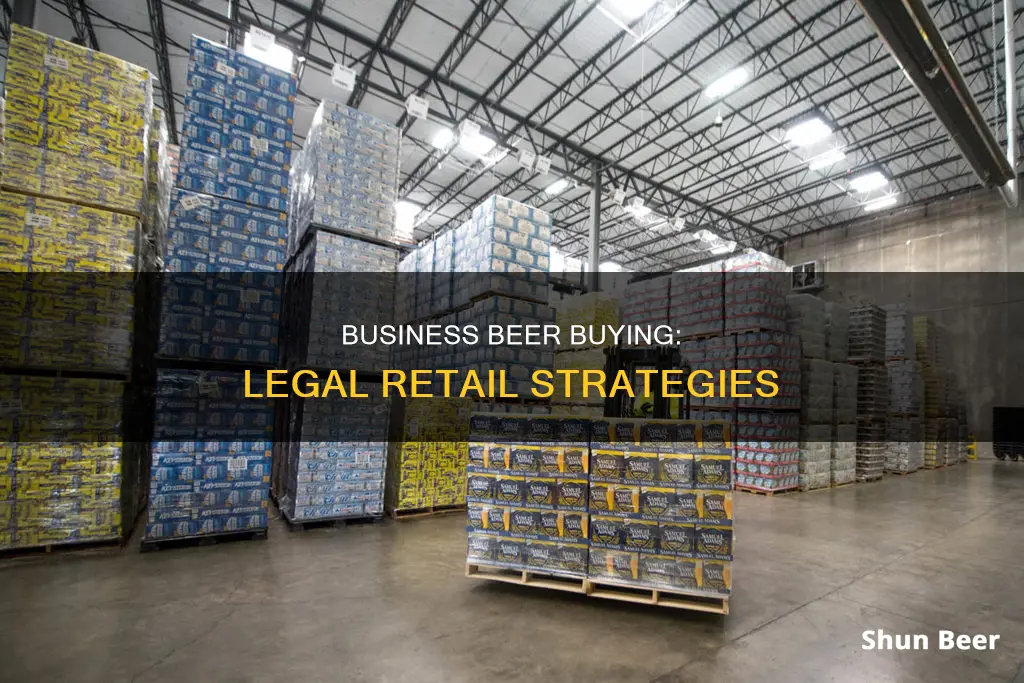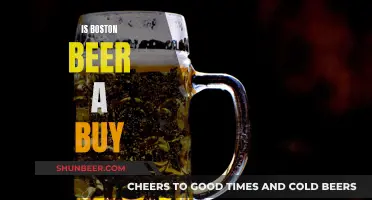
In the United States, businesses must comply with certain federal laws and regulations to legally sell beer for consumption on or off their premises. These laws vary by state, but generally, a license is required to sell alcoholic beverages. For example, in California, there are different types of retail licenses that authorise the sale of alcoholic beverages, including on-sale general, off-sale general, on-sale beer and wine, and off-sale beer and wine licenses. Obtaining a license typically involves contacting the local Alcoholic Beverage Control (ABC) office and meeting specific requirements, such as maintaining a certain distance from churches, schools, and residences. Businesses must also comply with record-keeping requirements and ensure that their premises are subject to inspection by authorised officers.
What You'll Learn

Get a license to sell alcohol
To legally sell beer, a business must obtain a liquor license. The process of obtaining a liquor license can be complex and varies depending on the state and municipality. In general, the first step is to determine the type of liquor license needed, as there are different licenses for retail and wholesale operations, on-premise and off-premise consumption, and the type of alcohol being sold.
The next step is to contact the local licensing authority, typically the Department of Alcoholic Beverage Control or a similar agency, to understand the specific requirements and application process. This may include completing an application form, providing fingerprints, proof of financial backing, occupancy rights, and various operating licenses and permits. In some cases, a business plan may also be required. It is important to ensure that the application is complete and accurate, as incomplete or incorrect applications may be rejected or delayed.
After submitting the application, there may be a waiting period of several weeks or months while the application is processed and investigated. During this time, the business may be required to post public notices of their application and may need to obtain approval from local officials, such as the zoning department or city council. Once the license is approved, the business will need to renew it periodically, typically every one to three years.
It is important to note that the sale of alcohol is highly regulated, and there may be restrictions on the number of licenses available in a particular area. Additionally, there may be local laws and regulations that prohibit or restrict the sale of alcohol in certain locations, such as near churches, schools, or residences. As such, it is essential for businesses to carefully research and understand the specific requirements and regulations in their area before applying for a liquor license.
In summary, obtaining a license to sell alcohol can be a complex and time-consuming process, but it is a necessary step for any business that wishes to legally sell beer or other alcoholic beverages. By understanding the requirements and working closely with the relevant authorities, businesses can successfully navigate the process and obtain the necessary licenses to operate their business.
Best Places to Buy Beer Yeast
You may want to see also

Register with the Alcohol and Tobacco Tax and Trade Bureau (TTB)
Registering with the Alcohol and Tobacco Tax and Trade Bureau (TTB) is a crucial step for businesses intending to legally resell beer, wine, or distilled spirits. The TTB, established in 2003 under the Homeland Security Act, is responsible for regulating and collecting taxes on trade and imports of alcohol, tobacco, and firearms within the United States.
Every retail dealer of beer, wine, or distilled spirits must register with the TTB, even though the special tax for retail dealers has been repealed. This registration is mandatory and ensures compliance with federal laws and regulations. Businesses must use the TTB F 5630.5d form to register, and it is important to note that any past due tax liabilities incurred before the repeal must still be paid.
If there are any changes in the business, such as a relocation or a change in ownership, it is essential to amend your registration using the same form. Additionally, if a retail dealer sells to another dealer, they may need to register as a wholesale dealer and obtain a wholesaler's basic permit.
The TTB provides resources and guidance to assist businesses in understanding and complying with federal tax, product, and marketing requirements. It is important for businesses to be aware of and adhere to all relevant regulations to avoid severe penalties and legal consequences.
Best Places to Buy Ibc Root Beer
You may want to see also

Understand the different types of retail licenses
The type of retail license a business needs depends on the nature of the business and the type of alcoholic beverages it intends to sell. Here is a list of the different types of retail licenses:
On-Premises Licenses
On-premises licensees can sell and serve alcohol by the glass for consumption on the premises. All on-premises licensees are required to sell food at all hours of operation. Examples include bars, restaurants, taverns, and hotels.
Off-Premises Licenses
Off-premises licensees can sell alcoholic beverages by the bottle to go for consumption somewhere other than the licensed premises. Examples include liquor stores, wine stores, grocery stores, convenience stores, and drug stores.
On-Sale General
This license authorizes the sale of all types of alcoholic beverages, namely beer, wine, and distilled spirits, for consumption on the premises, and the sale of beer and wine for consumption off the premises.
On-Sale Beer and Wine
This license authorizes the sale of all types of wine and malt beverages (e.g., beer, porter, ale, stout, and malt liquor) for consumption on and off the premises.
Off-Sale Beer and Wine
This license authorizes the sale of all types of wine and malt beverages for consumption off the premises in original, sealed containers.
On-Sale Beer
This license authorizes the sale of malt beverages for consumption on and off the premises.
Retail Beverage License
This is the most common type of license, allowing businesses to sell beer, wine, or other alcoholic beverages on a retail basis. Many categories exist, and the specific license needed depends on the type of business and the type of beverages to be sold. For example, a separate license is needed for selling both beer and wine, and another license is required if only selling beer.
Bottle Club License
This license authorizes a business operating as a bottle club to allow customers to bring in their own alcoholic beverages.
Off-Premises Storage Permit
This permit allows businesses to store alcoholic beverages somewhere other than their main premises if they already have the proper master license.
Event License
This license can cover up to three days and allows a non-profit organization to host an event where alcohol is sold or served.
Murphy, NC: Beer Buying on Sundays
You may want to see also

Comply with federal laws and regulations
To comply with federal laws and regulations, businesses must adhere to the following:
Firstly, retail dealers of beer must register with the Alcohol and Tobacco Tax and Trade Bureau (TTB) and comply with the requirements outlined by the bureau. This includes the necessity to amend registration if there are any changes in the business location, ownership, or control.
Secondly, specific permits are required if the business intends to sell beer to another dealer for the purpose of resale. Retail dealers must obtain a wholesaler's basic permit under the Federal Alcohol Administration Act.
Thirdly, businesses must adhere to regulations regarding the closure of bottles of distilled spirits. Secure tamper-evident closures or similar devices are mandated for all bottles to prevent refilling or reuse.
Fourthly, the refilling, reusing, or improper disposition of liquor bottles is prohibited. Retail dealers must ensure that used liquor bottles are only possessed by those who have emptied them, with specific exceptions outlined in the regulations.
Fifth, retail dealers are restricted in their purchases of distilled spirits and can only acquire them from wholesale dealers, proprietors of distilled spirits plants, administrators, executors, or receivers in bankruptcy, and dealers who are going out of business.
Sixth, record-keeping is essential, and retail dealers must maintain detailed records of all distilled spirits, wine, and beer received and sold. These records must include the date, quantity, and source of the beverages, as well as the name and address of the purchaser for specific sales quantities.
Seventh, businesses must allow for inspection by TTB officers, who have the authority to examine records and accept offers in compromise of liability arising from federal liquor law violations.
Lastly, businesses must comply with additional state-specific regulations, such as those outlined by the Alcoholic Beverage Control (ABC) in California, which include license requirements, restrictions on the location of licensed premises, and guidelines for selling alcoholic beverages to-go.
Efes Beer: Can Brits Buy It?
You may want to see also

Understand the penalties for non-compliance
It is important to understand the penalties for non-compliance with alcohol licensing laws, as these vary depending on the region and the nature of the violation. In Queensland, Australia, for instance, non-compliance with liquor laws is taken seriously, with police and compliance officers authorized to issue on-the-spot fines and penalties for breaches of the Liquor Act 1992 and Wine Industry Act 1994.
In the United States, penalties for non-compliance can include suspension or revocation of the license, fines, and even criminal prosecution. For example, a retail dealer who refills liquor bottles or reuses them by adding distilled spirits or any other substance can face a fine of up to $1000, imprisonment for up to a year, or both. Similarly, possessing used liquor bottles is prohibited, and violators are subject to a fine of up to $1000, imprisonment, or both.
Additionally, failing to keep proper records of distilled spirits, wine, and beer received and sold can result in penalties. Dealers who, with fraudulent intent, fail to maintain the required records may face a fine of up to $10,000 and imprisonment for up to 5 years. If there is no fraudulent intent, the penalty is a fine of up to $1000 and/or imprisonment for up to a year.
It is worth noting that these penalties can also apply to the transfer of licenses. For instance, if a licensee pledges the transfer of a license as security for a loan or to fulfill an agreement, they can face penalties. Furthermore, if a licensee forcibly rescues liquor or other property seized by a TTB officer, they may be fined up to $500 or double the value of the property, whichever is greater, or face imprisonment for up to 2 years.
Buying Beer at Wawa in Pennsylvania: What's the Deal?
You may want to see also
Frequently asked questions
A business must obtain a license to sell alcohol. In the US, the Alcohol and Tobacco Tax and Trade Bureau outlines the federal requirements for retail dealers of beer, wine, and spirits. These include registering with the TTB, obtaining a wholesaler's basic permit if selling to another dealer, and complying with requirements on the storage and disposal of liquor bottles.
There are several types of retail licenses, including On-Sale General, Off-Sale General, On-Sale Beer and Wine, and Off-Sale Beer and Wine. On-Sale licenses authorise the sale of alcoholic beverages for consumption on the premises, while Off-Sale licenses authorise the sale of alcoholic beverages for consumption off the premises.
The process for obtaining a license varies by location. In California, for example, businesses must apply through the state's Alcoholic Beverage Control (ABC) District Office. The ABC will then conduct an investigation to determine if the applicant and location meet the necessary licensing requirements.
Yes, there are several restrictions on the sale of alcoholic beverages. For example, alcoholic beverages cannot be sold to anyone under the age of 21, and businesses may not sell alcoholic beverages within a certain distance of schools, churches, or hospitals. Additionally, there may be restrictions on the types of alcoholic beverages that can be sold for off-site consumption.
Violating alcohol resale laws can result in severe penalties, including criminal prosecution and fines. For example, refilling liquor bottles or possessing used liquor bottles can result in a fine of up to $1000 or imprisonment for up to one year.







